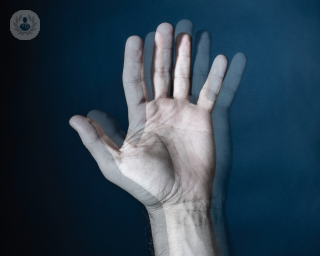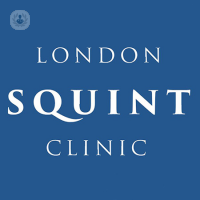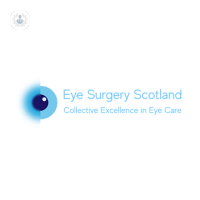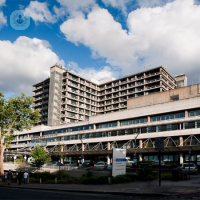What is diplopia?
Diplopia, also called double vision, is an eye condition in which the images perceived by the eyes are not processed in the brain as a single spatial image, and instead, the brain sees two images. Depending on its origin, it can be of two types:
- binocular: the most common type, where the eyes do not line up with each other correctly. It is usually related to strabismus.
- monocular: a much less common form that is characterised by double vision generated only by one eye. It is related to an abnormality of the eye, such as astigmatism or a type of cataract.

In terms of symptoms, diplopia can be categorised as:
- horizontal: the images appear side by side.
- vertical: the images appear one on top of the other.
- diagonal: the images appear misaligned both horizontally and vertically.
What are the symptoms of diplopia?
Apart from double vision, other symptoms can include:
- pain around the eyes
- pain during eye movements in one or both eyes
- headache
- nausea
- weakness (usually in the eyes)
- drooping eyelids
What causes diplopia?
There are many things which can cause diplopia, including:
- problems with the eye muscles such as Graves’ disease or myasthenia gravis
- eye injury from scars, dry eyes, or infections
- lens problems such as cataracts
- nerve problems as a result of diabetic retinopathy or multiple sclerosis
- brain damage due stroke, tumour, or alcohol
- congenital problems such as strabismus
Can diplopia be prevented?
Some causes of diplopia can be prevented, for example, by using the seatbelt in the car to avoid trauma, or by putting on glasses and head protection during any sporting activity or at work, if necessary. In addition, people with diabetes can lower the risk by controlling their blood sugar level.
What is the treatment for diplopia?
The treatment will depend on the causes of the disease, so it is important to first come to a definitive diagnosis through thorough eye testing and in some cases, blood tests or scans. Treatment may include medication or surgery to correct damage to the eye. If the double vision cannot be fully cured, you will be prescribed special glasses to improve your vision.
01-27-2017 01-19-2024Diplopia (double vision)
Mr Christos Moraitis - Ophthalmology
Created on: 01-27-2017
Updated on: 01-19-2024
Edited by: Conor Dunworth
What is diplopia?
Diplopia, also called double vision, is an eye condition in which the images perceived by the eyes are not processed in the brain as a single spatial image, and instead, the brain sees two images. Depending on its origin, it can be of two types:
- binocular: the most common type, where the eyes do not line up with each other correctly. It is usually related to strabismus.
- monocular: a much less common form that is characterised by double vision generated only by one eye. It is related to an abnormality of the eye, such as astigmatism or a type of cataract.

In terms of symptoms, diplopia can be categorised as:
- horizontal: the images appear side by side.
- vertical: the images appear one on top of the other.
- diagonal: the images appear misaligned both horizontally and vertically.
What are the symptoms of diplopia?
Apart from double vision, other symptoms can include:
- pain around the eyes
- pain during eye movements in one or both eyes
- headache
- nausea
- weakness (usually in the eyes)
- drooping eyelids
What causes diplopia?
There are many things which can cause diplopia, including:
- problems with the eye muscles such as Graves’ disease or myasthenia gravis
- eye injury from scars, dry eyes, or infections
- lens problems such as cataracts
- nerve problems as a result of diabetic retinopathy or multiple sclerosis
- brain damage due stroke, tumour, or alcohol
- congenital problems such as strabismus
Can diplopia be prevented?
Some causes of diplopia can be prevented, for example, by using the seatbelt in the car to avoid trauma, or by putting on glasses and head protection during any sporting activity or at work, if necessary. In addition, people with diabetes can lower the risk by controlling their blood sugar level.
What is the treatment for diplopia?
The treatment will depend on the causes of the disease, so it is important to first come to a definitive diagnosis through thorough eye testing and in some cases, blood tests or scans. Treatment may include medication or surgery to correct damage to the eye. If the double vision cannot be fully cured, you will be prescribed special glasses to improve your vision.


Diplopia: why am I seeing double?
By Miss Stephanie West
2024-12-27
Diplopia is what eye specialists call double vision, a condition that can affect both eyes or just one and causes a person to see two images of a single object. Miss Stephanie West, an ophthalmologist who specialises in treating this condition, outlines what diplopia is and how it can affect people's daily lives. See more
Experts in Diplopia (double vision)
-
Miss Stephanie West
OphthalmologyExpert in:
- Paediatric ophthalmology
- Strabismus (squint)
- Diplopia (double vision)
- Amblyopia
- Botulinum toxin (Botox™)
- Cataracts
-
Mr Conrad Schmoll
OphthalmologyExpert in:
- Cataracts
- Cataract surgery
- Paediatric ophthalmology
- Cataracts in children
- Strabismus (squint)
- Diplopia (double vision)
-
Mr Christos Moraitis
OphthalmologyExpert in:
- Neuro-ophthalmology
- Paediatric ophthalmology
- Amblyopia
- Myopia
- Optic neuritis
- Diplopia (double vision)
-
-
Ms Safina Rashid
Healthcare professionalsExpert in:
- Vision therapy
- Amblyopia
- Diplopia (double vision)
- Glaucoma
- Strabismus (squint)
- Headache
- See all

London Squint Clinic
London Squint Clinic
St. George's Hospital, Blackshaw Rd, London SW17 0QT, United Kingdom
No existe teléfono en el centro.
By using the telephone number provided by TOP DOCTORS, you automatically agree to let us use your phone number for statistical and commercial purposes. For further information, read our Privacy Policy
Top Doctors

Eye Surgery Scotland
Eye Surgery Scotland
40 Colinton Road, EH10 5BT
No existe teléfono en el centro.
By using the telephone number provided by TOP DOCTORS, you automatically agree to let us use your phone number for statistical and commercial purposes. For further information, read our Privacy Policy
Top Doctors

The Royal Free Hospital
The Royal Free Hospital
Pond Street, Hampstead. NW3 2QG
No existe teléfono en el centro.
By using the telephone number provided by TOP DOCTORS, you automatically agree to let us use your phone number for statistical and commercial purposes. For further information, read our Privacy Policy
Top Doctors
-
London Squint Clinic
St. George's Hospital, Blackshaw Rd, London SW17 0QT, United Kingdom, Central LondonExpert in:
- Complex eye conditions
- Ophthalmology
- Dry eye
-
Eye Surgery Scotland
40 Colinton Road, EH10 5BT, EdinburghExpert in:
- Cataracts
- Retina and Vitreous
- Lens replacement
-
The Royal Free Hospital
Pond Street, Hampstead. NW3 2QG, Central LondonExpert in:
- General Surgery
- Orthopaedic surgery
- Robotic Surgery
- Dermatology
- Obstetrics and Gynaecology
- Paediatrics
- Most viewed diseases, medical tests, and treatments
- Visual impairment
- Diabetic retinopathy
- Retina
- Visual stress (Meares-Irlen syndrome)
- Presbyopia
- Nystagmus
- Myopia
- Hyperopia (farsightedness)
- Eye examination
- Demodex







